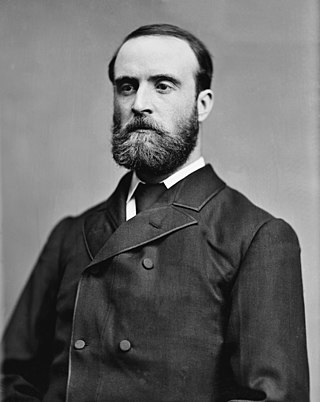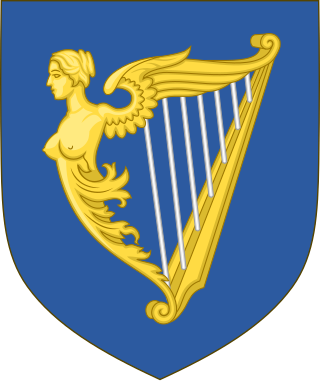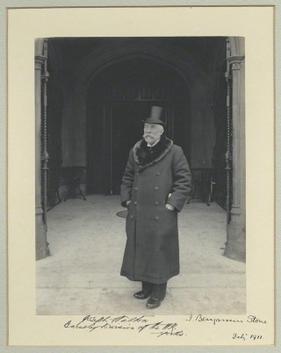Related Research Articles

Charles Stewart Parnell was an Irish nationalist politician who served as a Member of Parliament (MP) in the United Kingdom from 1875 to 1891, Leader of the Home Rule League from 1880 to 1882, and then of the Irish Parliamentary Party from 1882 to 1891, who held the balance of power in the House of Commons during the Home Rule debates of 1885–1886. He fell from power following revelations of a long-term affair, and died at age 45.

The Home Rule League (1873–1882), sometimes called the Home Rule Party, was an Irish political party which campaigned for home rule for Ireland within the United Kingdom of Great Britain and Ireland, until it was replaced by the Irish Parliamentary Party. The Home Rule Confederation of Great Britain was a sister organisation in Great Britain.
Edward Sheil was an Irish nationalist politician. He was a Member of Parliament (MP) for Athlone from 1874 to 1880, for Meath from 1882 to 1885, and for South Meath from 1885 to 1892, taking his seat in the House of Commons of the United Kingdom of Great Britain and Ireland.
James William Barclay was a Scottish businessman, farmer and politician. For nineteen years he was member of parliament for Forfarshire.

John Jones Jenkins, 1st Baron Glantawe was a Welsh tin-plate manufacturer and Liberal politician. Having commenced working at the Upper Forest Tinplate Works in Morriston, at the age of fifteen, he ended his life as one of the wealthiest men in Glamorgan.

Sir Joseph Walton, 1st Baronet, DL, JP was an English coalowner and Liberal Party politician.
Thomson Hankey was a British merchant, a banker and a Liberal Party politician.
The 1890 Bassetlaw by-election was a parliamentary by-election held for the British House of Commons constituency of Bassetlaw in Nottinghamshire on 15 December 1890.

John Lowles was a British businessman and Conservative Party politician.
The 1910 Liverpool Kirkdale by-election was a parliamentary by-election held in England on 20 July 1910 for the British House of Commons constituency of Liverpool Kirkdale.
The 1897 Liverpool Exchange by-election was a by-election held in England on 10 November 1897 for the British House of Commons constituency of Liverpool Exchange.
The 1886 Derby by-election was a parliamentary by-election held for the House of Commons constituency of Derby, the county town of Derbyshire on 9 February 1886.
The 1903 Liverpool West Derby by-election was held on 20 January 1903 after the death of the incumbent Conservative MP Samuel Wasse Higginbottom. It was retained by the Conservative candidate Watson Rutherford.
The 1880 Drogheda by-election was fought on 2 March 1880. The by-election, to the United Kingdom House of Commons, arose through the death of the incumbent Home Rule League Member of Parliament, William Hagarty O'Leary. It was won by Benjamin Whitworth, who had previously sat for the seat as a Liberal but on this occasion announced that he supported the Home Rule cause. He had resigned his current seat, at Kilkenny, in order to run. He received 382 votes as against 181 for J. McCoan, candidate of the Home Rule League. It was reported that 150 Conservative voters had abstained in response to a circular from the party.
The 1879 Donegal by-election was fought on 15 December 1879. The by-election, to one of two seats in the UK House of Commons constituency of Donegal, arose due to the death of the incumbent Conservative MP, William Wilson.
The 1911 North Tyrone by-election was a Parliamentary by-election. North Tyrone returned one Member of Parliament (MP) to the House of Commons of the United Kingdom, elected by the first past the post voting system. The by-election was held on 6 October 1911.
The North West Staffordshire by-election was a Parliamentary by-election held on 31 July 1907. The constituency returned one Member of Parliament (MP) to the House of Commons of the United Kingdom, elected by the first past the post voting system.
The 1905 Carlisle by-election was a Parliamentary by-election held on 14 July 1905. The constituency returned one Member of Parliament (MP) to the House of Commons of the United Kingdom, elected by the first past the post voting system.
The Appleby by-election was a Parliamentary by-election held on 2 March 1905. The constituency returned one Member of Parliament (MP) to the House of Commons of the United Kingdom, elected by the first past the post voting system.
The 1882 Ennis by-election took place on 14 November 1882. The by-election, to the UK House of Commons constituency of Ennis, arose due to the resignation of the incumbent MP, James Lysaght Finegan, a supporter of the Home Rule League.